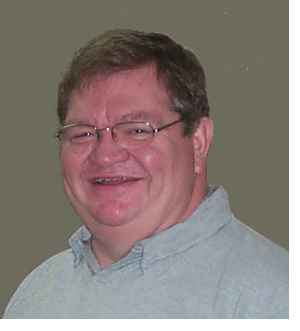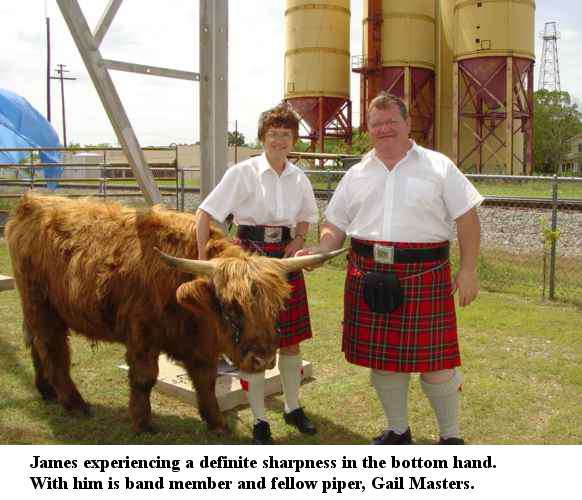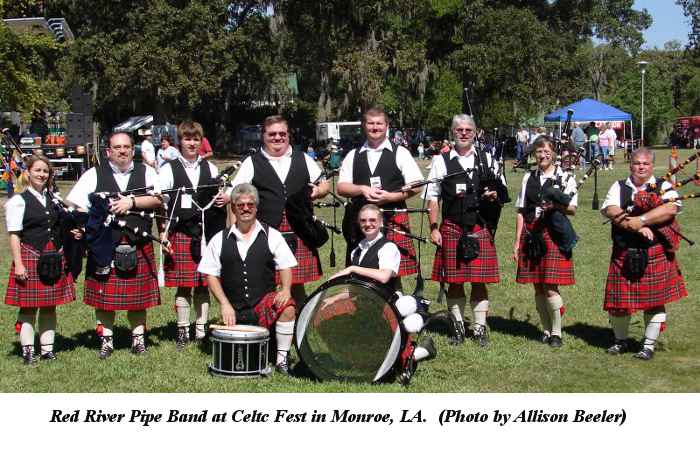|

|

By Scott Williams
 I first met James Parker at
the Ontario School of Piping at St. Andrews College, Aurora, ON
about eight years ago. James was from Louisiana, and had the room
next to mine in the residence. Between his self-described ‘slow
southern drawl with a bit of East Texas twang’, and his Scottish
instructor’s heavy Glasgow accent, communication in his class was a
little problematic. We had the same period off so, on the second
day, James knocked on my door and asked if I would explain a few
things. The next day, he brought along the rest of his band’s pipe
section, and we set up a little auxiliary class that met daily for
the rest of the course. The following year, I was invited to
officially join the teaching staff, and have been working with
beginner and intermediate level students at the OSP ever since.
James invited me to Shreveport to conduct a three-day workshop for
his band, which was one of the highlights of my piping career. I
have considered him and many of his band members to be very good
friends ever since. I first met James Parker at
the Ontario School of Piping at St. Andrews College, Aurora, ON
about eight years ago. James was from Louisiana, and had the room
next to mine in the residence. Between his self-described ‘slow
southern drawl with a bit of East Texas twang’, and his Scottish
instructor’s heavy Glasgow accent, communication in his class was a
little problematic. We had the same period off so, on the second
day, James knocked on my door and asked if I would explain a few
things. The next day, he brought along the rest of his band’s pipe
section, and we set up a little auxiliary class that met daily for
the rest of the course. The following year, I was invited to
officially join the teaching staff, and have been working with
beginner and intermediate level students at the OSP ever since.
James invited me to Shreveport to conduct a three-day workshop for
his band, which was one of the highlights of my piping career. I
have considered him and many of his band members to be very good
friends ever since.
James was born in Houston Texas in June 1957. The
family moved to Shreveport when he started the second grade and he
continues to make his home in that area to this day. “My father, James T.
Parker Sr. is a retired fitter/welder,” James says. “My mother, Betty
Brent Parker now has gone to the Lord. Neither of my parents played pipes,
but they were very supportive of my music and any other interest I wanted
to pursue. I was truly blessed to have them as my parents. I have two
sisters, Samantha and Regina, one brother Ronald who passed away shortly
after birth, and a younger brother Robert who likes the pipes very much
but does not play. I have a lovely wife, Deborah, three wonderful
daughters,
three sons-in-law, and
one grandson, aged 3. My main hobby is piping, but I
also enjoy sailing, fishing, camping, movies, playing the alto sax, lead soldiers, casting metal, and
my grandson, soon to be a piper if I have my way. I
own J.T. P. Services, a small oil field service company mainly dealing with mudlogging.” (Note: James
has instruments that sample gas in the drilling mud. He takes drill-cutting samples so he can tell
the geologists what they are drilling through. He makes a graphic log with
that information as well as of the rate of penetration of the bit and of
the drill mud properties and provides other information on the drilling of a
well.) “A funny side note is that one of my hardhat stickers
sold on eBay for $35 a few months ago. That shocked me. I think
the seller might have been a truck driver I met a few months before
from Odessa, Texas. I gave him a sticker.”

James did not find out that he had roots in piping till after he
started learning to play. “My great grandfather on my mother's
mother’s side of the family played the pipes,” he explains. “My
grandmother told me how she listened to him as a child, and about
his ‘funny’ clothes that he kept in a trunk with the pipes. Through
time and moving a lot, none of the family now knows what happened to
the instrument he played, which is such a shame. Knowing about him,
however, does give me inspiration when I am playing for myself
sometimes. My mind drifts and I wonder, what would he think of my
playing?”
James went to High School at Woodlawn, in Shreveport and also took
night courses at Bossier Parish Community College. “My piping
journey started in high school,” James explains. “My first
instructor was my ROTC instructor, Sgt. Floyd J Courtade, RET. U.S.
Army. He did not play himself, but he wanted to form a pipe band. He
banged on the table a lot and would say ‘that does not sound right’,
or ‘play the record for us again’! He was a very important person in
my life and is a fine gentleman and honourable person. You could not
find a greater role model for me and for most of the students he
taught.
“The year was 1971. The Viet Nam War was winding down but as young
boys we all thought we would be going. I, like many of my friends,
thought if we’ve got to go, officer training and military knowledge
would be good to have so many of us joined the Corps. The first day
of high school, I went to my first ROTC class. The Sergeant seemed
like a huge bear of a man to me at the time. We were all scared a
little not knowing what to expect - too many boot camp movies, I
suppose. His voice boomed, ‘Who in here plays in the band or plays a
musical instrument?’ Two hands went up, mine and that of my good
friend Robert Davis, now our lead tip in the Red River Pipes and
Drums. He said, ‘You are in the wrong class. Report back here at
sixth period. I will get your schedules changed.’ And he did! Our
school’s band Director at the time, Mr. Charles Caskey was helping
Sarge to get a pipe band going. He didn’t play either. The Logan’s
Tutor Book was all we had at the start.
“Some of us kids started with the band from the beginning in 1969
when Sarge went over to Scotland and brought back sets of Sinclair
pipes. I still have mine. They still sound great and look good at
Halloween, with orange-coloured mounts on the African Blackwood
drones. It was mostly kids who did not know how to play teaching
other kids, and that was not a good thing as we found out that first
summer when we went to a Highland games in Houston to play all 15 of
our tunes. We played with no gracenotes except the Hi G gracenote at
times and we just fingered the melody any way we wanted to. Tuning?
What was that? We just blew up our pipes and played. It was not a
good experience. Most of the other bands that were there would have
nothing to do with us, or each other, for that matter. Members from
one band did come to help us, however. They were Shriners from
Houston. They spoke to Sarge and, the next thing we knew, we had
summer school for two weeks set up in Dallas, Texas in 1972! We got
a new book that we called the ‘Little Green Book’ before we knew to
call it the ‘College of Piping Tutor’.
“My
first piping teacher
that could actually play was Seumas MacNeill, from Glasgow, Scotland, the
co-principal of the College of piping, co-author of the little green book, and head instructor
at the summer school. He was soft-spoken and proper, gentle but firm, and
you could not get away with anything! The first day of the summer school we had
to audition for our class placement. I walked in and he introduced himself and asked me how
many tunes I could play on the pipes. I said all of them!
His eyebrows shot up and he said ‘Really. As many as that!’ I then said
well, all the tunes in your book and some others too, perhaps about
20 altogether. He said, ‘Play your best one.’ I got the first
3 bars of Scotland the Brave out before he stopped me and thanked me
very much. I went out and then in went the next piper from our
band. There were seven of us in all.
“Later, they posted assigned classes using colours. We
were all in the Blue Class! Only one other piper was good enough to be in our
class, but we did not know who he was. Our lesson time came
and we were so happy with ourselves. Here we were in Dallas, all in the
same class, 9th and 10th Grade boys, on top of the world! Then
the other boy came in, and we all looked at him. He
was a little kid, in the 5th grade. ‘Wow,’ I asked him, ‘How long
have you been playing?’ He said, ‘Oh I never have!’ I turned to my
buddies and said, ‘Boys, we are in trouble!’
“It is a long hard road to correct wrong fingering! That first
summer school we made it through ‘Scots Way Hey’, as we say it
(actually, it’s “Scots Wha Hae”, the first tune in the little green
book). And, you know, it is so much easier to play on a bag that has
had some seasoning in it! We learned that too! (Note: seasoning
helps to keep the bag airtight.) We did a lot of work through the
summer with lots of playing and we were getting much better but the
tuning remained a problem, though the cane drone reeds were getting
easier to deal with because of our newfound knowledge.”
James and his friends went to the summer school again in 1974. This
time they were placed in the next to the top class. “I don't
remember the colour,” James adds, “but Mr. Mac Neill was very
impressed. I was also very lucky to meet Mr. Duncan Johnstone. As a
boy, I found him to be a nice and funny man who could shoot some
zingers at times. He had a thicker accent than Mr. MacNeill, and was
a little harder to understand, but so was I, with my slow southern
drawl with a bit of East Texas Twang thrown in. I was so impressed
by him that I composed a march for him. Mr. Mac Neill wrote the
rhythms out for me at break time. Funny thing was, I did not know I
was writing a tune for one of the piping world’s most prolific
composers. “Salute to Duncan Johnstone” was the name I put to it. He
was very gracious and played through it with a smile. I was very
proud at the time, I admit. Had I know who he was, I would have been
terrified and would never have had the guts to write a tune for
HIM!”
James continued playing through high school and then started a band
with other grads from Woodlawn a few years after. With people
moving, and working lives getting in the way at times, however, the
musicians slowly disbanded. “I continued to play for funerals, and
at my school’s memorial for former students who were lost in Viet
Nam. Sadly, more names have been added to the Memorial in recent
years. I still play for it as I have done almost every year since
1971. I missed only two years. One was when I was overseas working
and I had a friend cover for me. The other was when a new principal
at the school decided the Memorial was not time well spent and
cancelled it. He soon found he had a firestorm on his hands, so the
Memorial has been reinstated.
“I only knew a few marches and slow airs and played only a few times
a year, usually when I was sought out. Then one day my daughter came
home from school and said her friend’s cousin, Shon wanted to know
if I would teach him to play. I was working a lot then and said I
don't know how much I could teach him, but I would try to show him
what I could. I gave him a few lessons and went off to work again
for a while.
“Then one day Shon, who later became my son-in-law, called me and
said Richard Wells, who was an old friend I had taught in High
School and who was blind from birth, was going to give piping
lessons at a local college. He taught the class for six weeks but
moved away shortly after a few of the students started a band. Shon
asked if I would come by and see if I could help them out. I was
more advanced than the others, so I started teaching what I knew,
and I was able to give them good fundamentals. While working with
them, I found out about many new things, such as synthetic reeds and
synthetic pipe bags – imagine, no more mixing honey with lanolin to
season the old hide bags!
“I also found out about Jim McGillivray’s Ontario School of Piping
summer program at Aurora, Ontario and I enrolled. I wanted to make
sure that what I was showing people was correct, and thankfully it
was, but it was just not enough! I went to the OPS summer school
almost every year since that time and it was a highlight in my life
to hear such great players and to study with so many of piping’s
great teachers! I had one very famous pipe teacher help me a lot,
and he even composed a tune for me! My band plays it in our
competition medley, and it has had many good comments from judges.
Thanks Scott! You know it was you!
 “Through the years, I have been extremely fortunate to have been
taught by the top players and teachers of the day - Jim McGillivray,
Rob Crabtree, Scott Williams, William Muirhead, Ken Eller, John
Cairns, Angus MacColl, John Recknagel, etc. There are many others
but these are the ones with whom I have had the most contact. I
cannot express the importance of going to a summer school if it is
at all possible. You will learn things that will amaze you! At the
right time, things will begin to click for you. I have had this
happen with all the instructors named above. The more exposure you
have, the better piper you can be!”
“Through the years, I have been extremely fortunate to have been
taught by the top players and teachers of the day - Jim McGillivray,
Rob Crabtree, Scott Williams, William Muirhead, Ken Eller, John
Cairns, Angus MacColl, John Recknagel, etc. There are many others
but these are the ones with whom I have had the most contact. I
cannot express the importance of going to a summer school if it is
at all possible. You will learn things that will amaze you! At the
right time, things will begin to click for you. I have had this
happen with all the instructors named above. The more exposure you
have, the better piper you can be!”
As James progressed in his own skills, he had a lot of success in
solo competitions in the South. He won the Piper of the Day awards
in Jackson, Louisiana and Jackson, Mississippi. “Too bad there is
not a Jackson, Scotland,” James quips.
James placed in the prize list at every Highland games at which he
competed. He is now playing at the Grade 2 level but hopes to move
up to Grade 1 soon. “My most memorable achievement was the time our
band placed second at one particular Games. Don't get me wrong - we
have won some firsts but this one stuck out in my mind because of my
band mates and what we had done. I was very happy with the quality
of our sound that day, and with all of our players and the work I
knew they had put in. We played a good performance for the crowd,
and had good remarks from the judges as well. We are still learning
and moving forward, and not doing too bad for a little band from the
black hole of piping!
“My most prestigious
achievement is a tune I composed, called “Debbie's Needle Point”. James
Mac Hattie put some harmony to it, and it was played in the Grade 1
Toronto Police Pipe Band medley a while back. How great is that! Another
great honour was to have you write a tune for me, Scott. I have it framed
with a picture of the two of us on my office wall. I have also had the
honour of playing to a number of great Military leaders of the United
States and a few famous actors as well as at the funerals of many local
people of interest. I played with the Shreveport Symphony twice as a guest
soloist to promote bagpiping in the community. On one occasion, I played
“The Orkney Wedding” and on the other I played “Brave Heart”. I had to
carve up an old Pakistani pipe chanter to make it tune to concert pitch
440 since the symphony wouldn’t tune to me.

“I belong to the Mid-West Piping Association. From
time to time I have gone to other bands that have asked for my help and I
am always glad to do so. I think we all want our music to get better and
to have the bagpipe recognized as the beautiful instrument it is. The more
we know and the more we practice, the more the public at large will hear
the beauty in our music that we do.
“Eight years ago we started a school in Shreveport to help improve
the standard of playing in our area. At first, it was for the Red
River Pipes and Drums’ members only with Willie Muirhead as the
teacher. It was well attended. The next year we incorporated The
Mardi Gras Parade with our float ride to draw people into our school
and had PM Ken Eller down from Ontario as the instructor. He has
been the lead instructor all these years since. As a band, one of
our goals was to break down barriers between bands and to get to
know other groups of people with the same interest in bringing the
level of playing up to a higher standard. I feel like we have met
this goal over and over again. We have had some of the greatest
pipers and adjudicators teach at our school, including the current
Glenfiddich Solo Piping Champion, Angus MacColl of Benderloch, near
Oban, Scotland. (Note: The Glenfiddich Championship is considered by
many to be solo piping’s ‘World Championship’.)
“Small classes are the way we go here. This year, we had five piping
instructors, Ken Eller, Jim McGillivray, Rob Crabtree, Jack Lee and
Angus MacColl, and one drumming instructor, Steve Cameron, with a
total of 51 students. The school is not a moneymaker by any stretch
of the imagination. We have never even broken even. Our band
subsidizes the school with money made throughout the year at paying
gigs. Everyone in the band contributes to make it happen. We want
the music in our area to be the best it can be!
“I think the biggest recommendation I have for bands is to recruit
the young but don't leave the old behind. This is a wonderful life
with music in it for everybody. Everyone can be of service to the
cause. Some of my best friends and family are in the band. Our band
has a wide spread in ages, but we are one big family at heart. That
makes it all the better.
“For people starting out, my advice to you is never give up. Any
instrument takes dedication and work to reap the rewards. Playing
the pipes is like taking uneven stairs. Your head is always ahead of
where your feet are, and so it is with playing. Your knowledge grows
quicker than your skill and it can be frustrating at times. Just
slog through it. It could take minutes, or months to get something
just right. We have all encountered the same problems. Some just get
through them quicker than others. The key is to never give up! You
may put the pipes down for a while but, the better you get, the
stronger the call of the blood becomes, and believe me, pipe music
does get in your blood! Seek out the best players and teachers. You
can learn from many different people. Take from each what works for
you. There are also many good books to learn from now and many
excellent recordings. However, in my mind and from my own
experience, having a good teacher with you is something that cannot
be beat!
“Someone asked me once what I would like on my
tombstone. I said well, somewhere there is an inscription that says, ‘Here
lies a piper’, and I am still aspiring to be
that!”
|